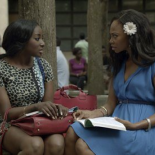A Nigerian university student wakes up with her middle-aged sugar daddy one morning and suggests that they start using condoms.
"Baby," the man croons smoothly, before brushing off her concerns with a Yoruba phrase that translates roughly as "an orange is not savoured with its peel on".
When the university student – who lives off handouts from multiple sexual partners – confronts him after discovering he is HIV positive, he tries to appease her with a shopping trip to Dubai.
The scenes are being played out by actors, but activists say Shuga, a gritty sex and relationships TV drama, is reaching young people in a way traditional Aids campaigns have rarely done.
For decades, attempts to curb HIV in Africa have either focused on medical solutions or behavioural changes – normally tied in with Christian-based abstinence messages. That has rarely worked in the continent's countries which have borne the brunt of a 30-year epidemic.
Now the producers behind Shuga, which has aired for two hugely successful seasons in Kenya, have shifted the drama to Lagos in the hope of tapping Africa's most populous country – and the continent's movie powerhouse.
The show premiered to rave reviews this week at a Lagos event studded with Nollywood stars, Afrobeats luminaries and some of the ordinary Nigerians who shine in the series.
"The issues are so real, but people can relate because it's not preachy or trying to change society," said Maria Okanrende, a DJ who plays a student trying to break into the music industry as an ex-boyfriend waltzes back into her life. "A lot of people are not going to like its rawness, but if you're watching it, you're going to talk afterwards. Everybody knows someone like my character."
The producers believe it is that ordinariness which appeals to young people, among whom Aids-related deaths have soared even while they fall within the general population, as the World Health Organisation reported this week.
Advertisement
"My 15 year-old hates it when I say this, but my belief is that in order to conquer HIV we really need to talk more about sex," Georgia Arnold, of MTV's Staying Alive Foundation, which has backed the series, said as clusters of teenagers tried to sneak into the star-studded event.
When she repeated that message later in front of a packed cinema audience, a nervous murmur ran through the crowd. But as the lights dimmed, it was clear just how much they were drawn by the painfully realistic depictions of campus life: the booze-fuelled mishaps with exes, wayward visiting younger sisters, friends in abusive relationships and the room-mate with an unwelcome live-in girlfriend.
The crowd roared with appreciative laughter when one character, at an HIV testing centre, struggled to remember how many sexual partners she had had, furtively counting on her fingers under the table.
Eventually she asks the unimpressed counsellor: "This year?"
Fighting an epidemic
With around 3.3 million patients, Nigeria's HIV rate is second only to South Africa globally. But in an often deeply religious and conservative society, social taboos about discussing sex mean up to 80% of people don't know their HIV status.
"When you talk to people about HIV in Nigeria, they say: 'We really don't have that problem here'," said Biyi Bandele, one of the show's writers, best known for directing the hit film Half of a Yellow Sun.
He said research trips to clinics had been an eye-opener. "There were people you would never guess had Aids queuing up, literally everybody you could ever meet. My hope is that this story will go into living rooms, and families will discuss it across whole generations."
Advertisement
There is evidence that initiatives such as Shuga are already doing that.
When South African health professor James Lees saw the first series screened in Amsterdam, he was gobsmacked: "At the end of it, I felt completely emotionally wrung out. I'd been waiting for this series for 20 years." Lee said he had since handed out thousands of copies of the film to community health workers and teachers.
A study this year found watching the series produced dramatic results in both awareness and willingness to talk about the disease among Lee's pupils – a breakthrough in a country where discussions around Aids are emotionally charged.
"What a lot of people sitting at their desks in Geneva or Brussels don't understand is that in the middle of an epidemic is a lot of trauma. When you have watched two, three, four loved ones, even the guy at the post office, go through incredibly painful deaths, would you be able to talk about it? Ironically,many teachers have vast personal experiences of HIV within their families, [but] most have been unable to bring that experience to their classrooms."
Lees said he hoped the next series would be set in South Africa.
For now, many of Shuga's Nigerian fans say the series has raised a crucial bar in the country's film industry.
"That kind of quality and social lifestyle it discusses is really important because Nigerian films have a way of catching fire online – you have people from London to Rio to Houston who are going to be watching this," said one enthusiast at the Lagos screening.
For Treasure Uchegbu, whose on-screen role as an Aids counsellor mirrors her real profession, filming was so realistic it brought back memories of one of her most heart-breaking experiences. "There was a 22-year-old who had never had sex; never done drugs. She fainted when we told her she was positive. But immediately before the test she had told me the place where she got one very small tattoo done, and I just knew what I was going to [have to] tell her."
As night approached, Treasure left the after-party to prepare for a 6am start at her mobile testing clinic.



